Environmental Sustainability Issues in Petroleum Contracting Report
VerifiedAdded on 2023/05/28
|23
|6520
|412
Report
AI Summary
This report analyzes sustainability issues within the petroleum contracting industry, examining the environmental, social, and economic impacts of operations from exploration to abandonment. It explores various petroleum contract types, including concessions, production sharing contracts, and service contracts, highlighting how they address sustainability concerns. The report delves into environmental degradation caused by exploration, production, and transportation activities, such as pollution and habitat destruction. It examines the role of transparency, public participation, and corporate social responsibility in mitigating these issues. The report also discusses international models for addressing environmental emergencies, such as the Iraq and Ghanaian models, while pointing out the ambiguities in cost responsibility. The analysis emphasizes the need for sustainable practices, community engagement, and comprehensive strategies to balance economic development with environmental protection and social well-being within the petroleum industry.
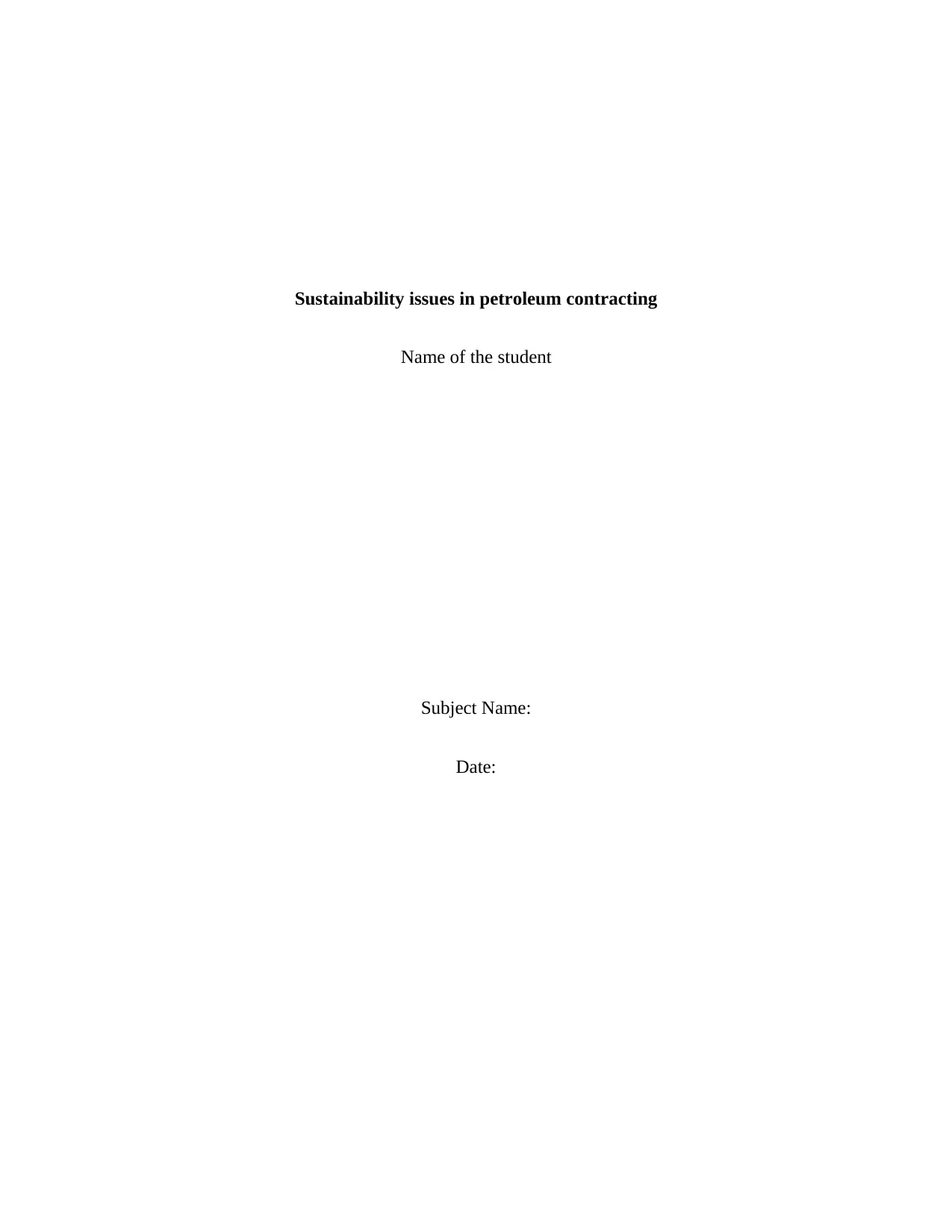
Sustainability issues in petroleum contracting
Name of the student
Subject Name:
Date:
Name of the student
Subject Name:
Date:
Paraphrase This Document
Need a fresh take? Get an instant paraphrase of this document with our AI Paraphraser
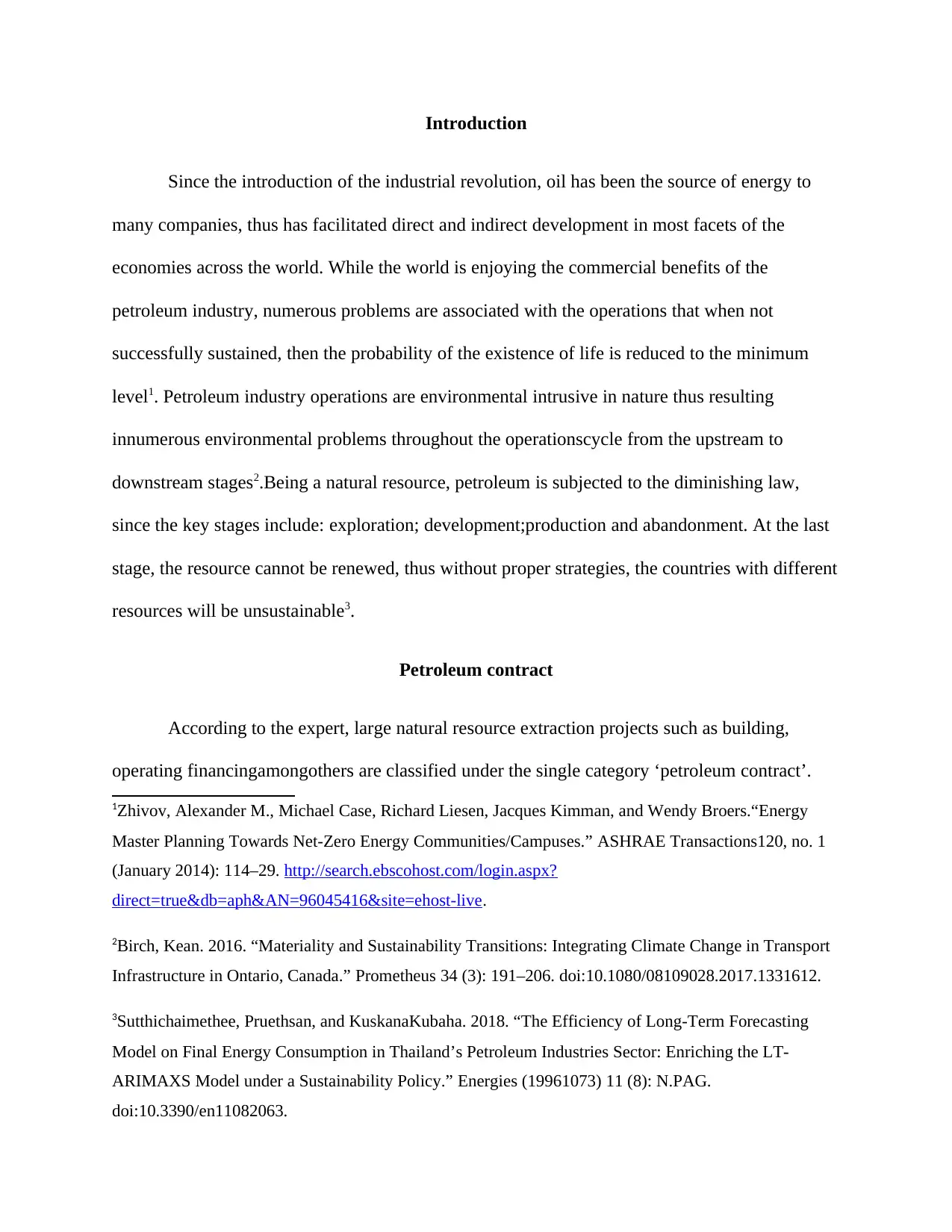
Introduction
Since the introduction of the industrial revolution, oil has been the source of energy to
many companies, thus has facilitated direct and indirect development in most facets of the
economies across the world. While the world is enjoying the commercial benefits of the
petroleum industry, numerous problems are associated with the operations that when not
successfully sustained, then the probability of the existence of life is reduced to the minimum
level1. Petroleum industry operations are environmental intrusive in nature thus resulting
innumerous environmental problems throughout the operationscycle from the upstream to
downstream stages2.Being a natural resource, petroleum is subjected to the diminishing law,
since the key stages include: exploration; development;production and abandonment. At the last
stage, the resource cannot be renewed, thus without proper strategies, the countries with different
resources will be unsustainable3.
Petroleum contract
According to the expert, large natural resource extraction projects such as building,
operating financingamongothers are classified under the single category ‘petroleum contract’.
1Zhivov, Alexander M., Michael Case, Richard Liesen, Jacques Kimman, and Wendy Broers.“Energy
Master Planning Towards Net-Zero Energy Communities/Campuses.” ASHRAE Transactions120, no. 1
(January 2014): 114–29. http://search.ebscohost.com/login.aspx?
direct=true&db=aph&AN=96045416&site=ehost-live.
2Birch, Kean. 2016. “Materiality and Sustainability Transitions: Integrating Climate Change in Transport
Infrastructure in Ontario, Canada.” Prometheus 34 (3): 191–206. doi:10.1080/08109028.2017.1331612.
3Sutthichaimethee, Pruethsan, and KuskanaKubaha. 2018. “The Efficiency of Long-Term Forecasting
Model on Final Energy Consumption in Thailand’s Petroleum Industries Sector: Enriching the LT-
ARIMAXS Model under a Sustainability Policy.” Energies (19961073) 11 (8): N.PAG.
doi:10.3390/en11082063.
Since the introduction of the industrial revolution, oil has been the source of energy to
many companies, thus has facilitated direct and indirect development in most facets of the
economies across the world. While the world is enjoying the commercial benefits of the
petroleum industry, numerous problems are associated with the operations that when not
successfully sustained, then the probability of the existence of life is reduced to the minimum
level1. Petroleum industry operations are environmental intrusive in nature thus resulting
innumerous environmental problems throughout the operationscycle from the upstream to
downstream stages2.Being a natural resource, petroleum is subjected to the diminishing law,
since the key stages include: exploration; development;production and abandonment. At the last
stage, the resource cannot be renewed, thus without proper strategies, the countries with different
resources will be unsustainable3.
Petroleum contract
According to the expert, large natural resource extraction projects such as building,
operating financingamongothers are classified under the single category ‘petroleum contract’.
1Zhivov, Alexander M., Michael Case, Richard Liesen, Jacques Kimman, and Wendy Broers.“Energy
Master Planning Towards Net-Zero Energy Communities/Campuses.” ASHRAE Transactions120, no. 1
(January 2014): 114–29. http://search.ebscohost.com/login.aspx?
direct=true&db=aph&AN=96045416&site=ehost-live.
2Birch, Kean. 2016. “Materiality and Sustainability Transitions: Integrating Climate Change in Transport
Infrastructure in Ontario, Canada.” Prometheus 34 (3): 191–206. doi:10.1080/08109028.2017.1331612.
3Sutthichaimethee, Pruethsan, and KuskanaKubaha. 2018. “The Efficiency of Long-Term Forecasting
Model on Final Energy Consumption in Thailand’s Petroleum Industries Sector: Enriching the LT-
ARIMAXS Model under a Sustainability Policy.” Energies (19961073) 11 (8): N.PAG.
doi:10.3390/en11082063.
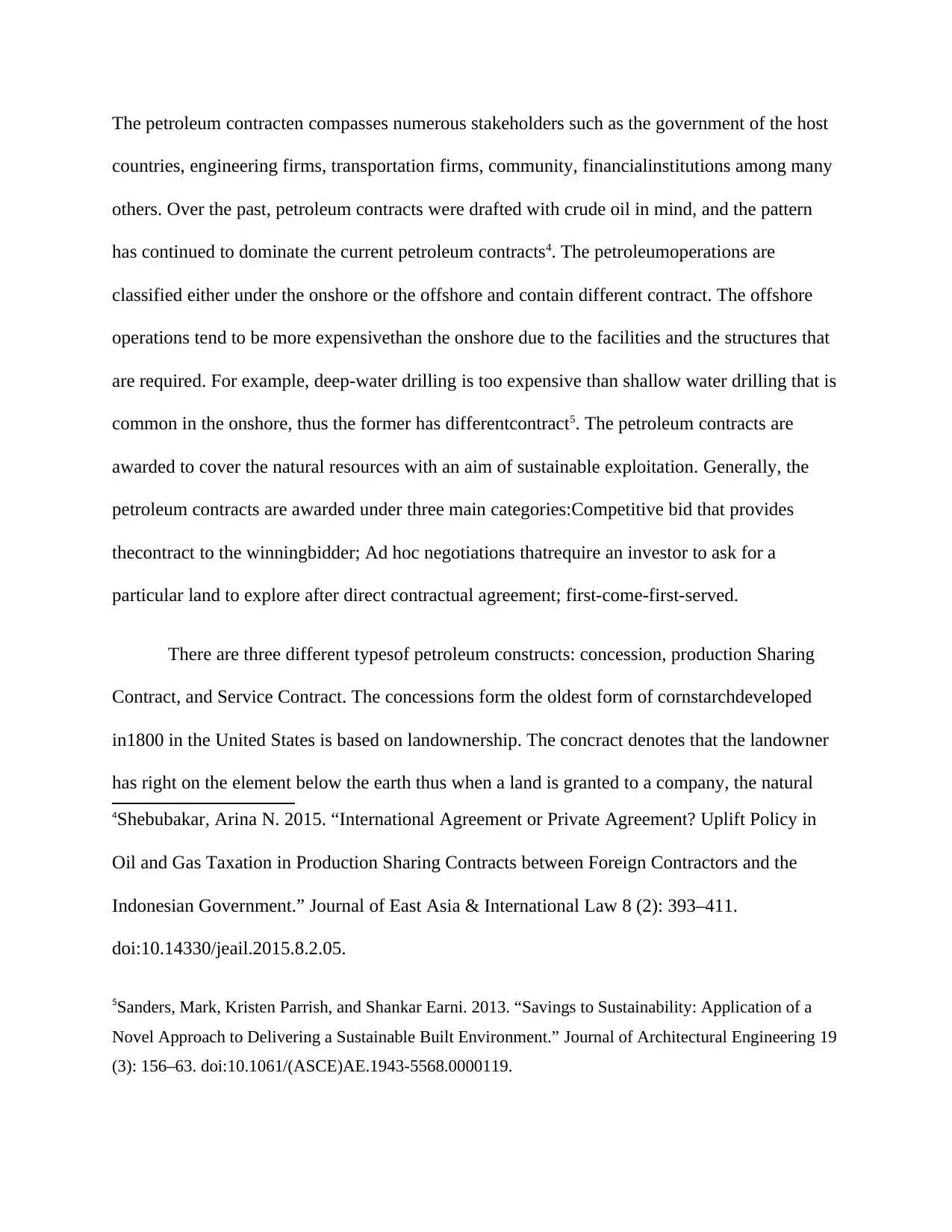
The petroleum contracten compasses numerous stakeholders such as the government of the host
countries, engineering firms, transportation firms, community, financialinstitutions among many
others. Over the past, petroleum contracts were drafted with crude oil in mind, and the pattern
has continued to dominate the current petroleum contracts4. The petroleumoperations are
classified either under the onshore or the offshore and contain different contract. The offshore
operations tend to be more expensivethan the onshore due to the facilities and the structures that
are required. For example, deep-water drilling is too expensive than shallow water drilling that is
common in the onshore, thus the former has differentcontract5. The petroleum contracts are
awarded to cover the natural resources with an aim of sustainable exploitation. Generally, the
petroleum contracts are awarded under three main categories:Competitive bid that provides
thecontract to the winningbidder; Ad hoc negotiations thatrequire an investor to ask for a
particular land to explore after direct contractual agreement; first-come-first-served.
There are three different typesof petroleum constructs: concession, production Sharing
Contract, and Service Contract. The concessions form the oldest form of cornstarchdeveloped
in1800 in the United States is based on landownership. The concract denotes that the landowner
has right on the element below the earth thus when a land is granted to a company, the natural
4Shebubakar, Arina N. 2015. “International Agreement or Private Agreement? Uplift Policy in
Oil and Gas Taxation in Production Sharing Contracts between Foreign Contractors and the
Indonesian Government.” Journal of East Asia & International Law 8 (2): 393–411.
doi:10.14330/jeail.2015.8.2.05.
5Sanders, Mark, Kristen Parrish, and Shankar Earni. 2013. “Savings to Sustainability: Application of a
Novel Approach to Delivering a Sustainable Built Environment.” Journal of Architectural Engineering 19
(3): 156–63. doi:10.1061/(ASCE)AE.1943-5568.0000119.
countries, engineering firms, transportation firms, community, financialinstitutions among many
others. Over the past, petroleum contracts were drafted with crude oil in mind, and the pattern
has continued to dominate the current petroleum contracts4. The petroleumoperations are
classified either under the onshore or the offshore and contain different contract. The offshore
operations tend to be more expensivethan the onshore due to the facilities and the structures that
are required. For example, deep-water drilling is too expensive than shallow water drilling that is
common in the onshore, thus the former has differentcontract5. The petroleum contracts are
awarded to cover the natural resources with an aim of sustainable exploitation. Generally, the
petroleum contracts are awarded under three main categories:Competitive bid that provides
thecontract to the winningbidder; Ad hoc negotiations thatrequire an investor to ask for a
particular land to explore after direct contractual agreement; first-come-first-served.
There are three different typesof petroleum constructs: concession, production Sharing
Contract, and Service Contract. The concessions form the oldest form of cornstarchdeveloped
in1800 in the United States is based on landownership. The concract denotes that the landowner
has right on the element below the earth thus when a land is granted to a company, the natural
4Shebubakar, Arina N. 2015. “International Agreement or Private Agreement? Uplift Policy in
Oil and Gas Taxation in Production Sharing Contracts between Foreign Contractors and the
Indonesian Government.” Journal of East Asia & International Law 8 (2): 393–411.
doi:10.14330/jeail.2015.8.2.05.
5Sanders, Mark, Kristen Parrish, and Shankar Earni. 2013. “Savings to Sustainability: Application of a
Novel Approach to Delivering a Sustainable Built Environment.” Journal of Architectural Engineering 19
(3): 156–63. doi:10.1061/(ASCE)AE.1943-5568.0000119.
⊘ This is a preview!⊘
Do you want full access?
Subscribe today to unlock all pages.

Trusted by 1+ million students worldwide
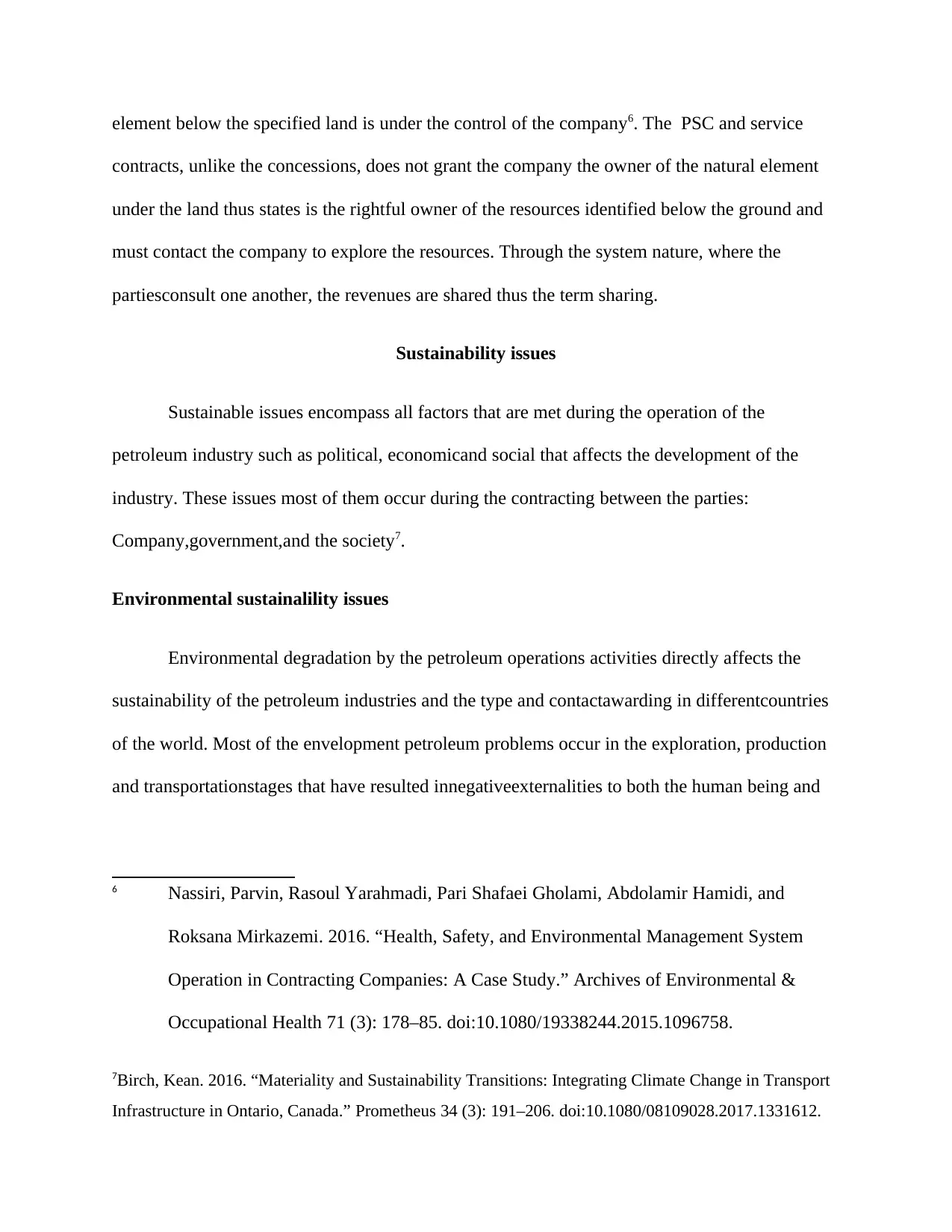
element below the specified land is under the control of the company6. The PSC and service
contracts, unlike the concessions, does not grant the company the owner of the natural element
under the land thus states is the rightful owner of the resources identified below the ground and
must contact the company to explore the resources. Through the system nature, where the
partiesconsult one another, the revenues are shared thus the term sharing.
Sustainability issues
Sustainable issues encompass all factors that are met during the operation of the
petroleum industry such as political, economicand social that affects the development of the
industry. These issues most of them occur during the contracting between the parties:
Company,government,and the society7.
Environmental sustainalility issues
Environmental degradation by the petroleum operations activities directly affects the
sustainability of the petroleum industries and the type and contactawarding in differentcountries
of the world. Most of the envelopment petroleum problems occur in the exploration, production
and transportationstages that have resulted innegativeexternalities to both the human being and
6 Nassiri, Parvin, Rasoul Yarahmadi, Pari Shafaei Gholami, Abdolamir Hamidi, and
Roksana Mirkazemi. 2016. “Health, Safety, and Environmental Management System
Operation in Contracting Companies: A Case Study.” Archives of Environmental &
Occupational Health 71 (3): 178–85. doi:10.1080/19338244.2015.1096758.
7Birch, Kean. 2016. “Materiality and Sustainability Transitions: Integrating Climate Change in Transport
Infrastructure in Ontario, Canada.” Prometheus 34 (3): 191–206. doi:10.1080/08109028.2017.1331612.
contracts, unlike the concessions, does not grant the company the owner of the natural element
under the land thus states is the rightful owner of the resources identified below the ground and
must contact the company to explore the resources. Through the system nature, where the
partiesconsult one another, the revenues are shared thus the term sharing.
Sustainability issues
Sustainable issues encompass all factors that are met during the operation of the
petroleum industry such as political, economicand social that affects the development of the
industry. These issues most of them occur during the contracting between the parties:
Company,government,and the society7.
Environmental sustainalility issues
Environmental degradation by the petroleum operations activities directly affects the
sustainability of the petroleum industries and the type and contactawarding in differentcountries
of the world. Most of the envelopment petroleum problems occur in the exploration, production
and transportationstages that have resulted innegativeexternalities to both the human being and
6 Nassiri, Parvin, Rasoul Yarahmadi, Pari Shafaei Gholami, Abdolamir Hamidi, and
Roksana Mirkazemi. 2016. “Health, Safety, and Environmental Management System
Operation in Contracting Companies: A Case Study.” Archives of Environmental &
Occupational Health 71 (3): 178–85. doi:10.1080/19338244.2015.1096758.
7Birch, Kean. 2016. “Materiality and Sustainability Transitions: Integrating Climate Change in Transport
Infrastructure in Ontario, Canada.” Prometheus 34 (3): 191–206. doi:10.1080/08109028.2017.1331612.
Paraphrase This Document
Need a fresh take? Get an instant paraphrase of this document with our AI Paraphraser
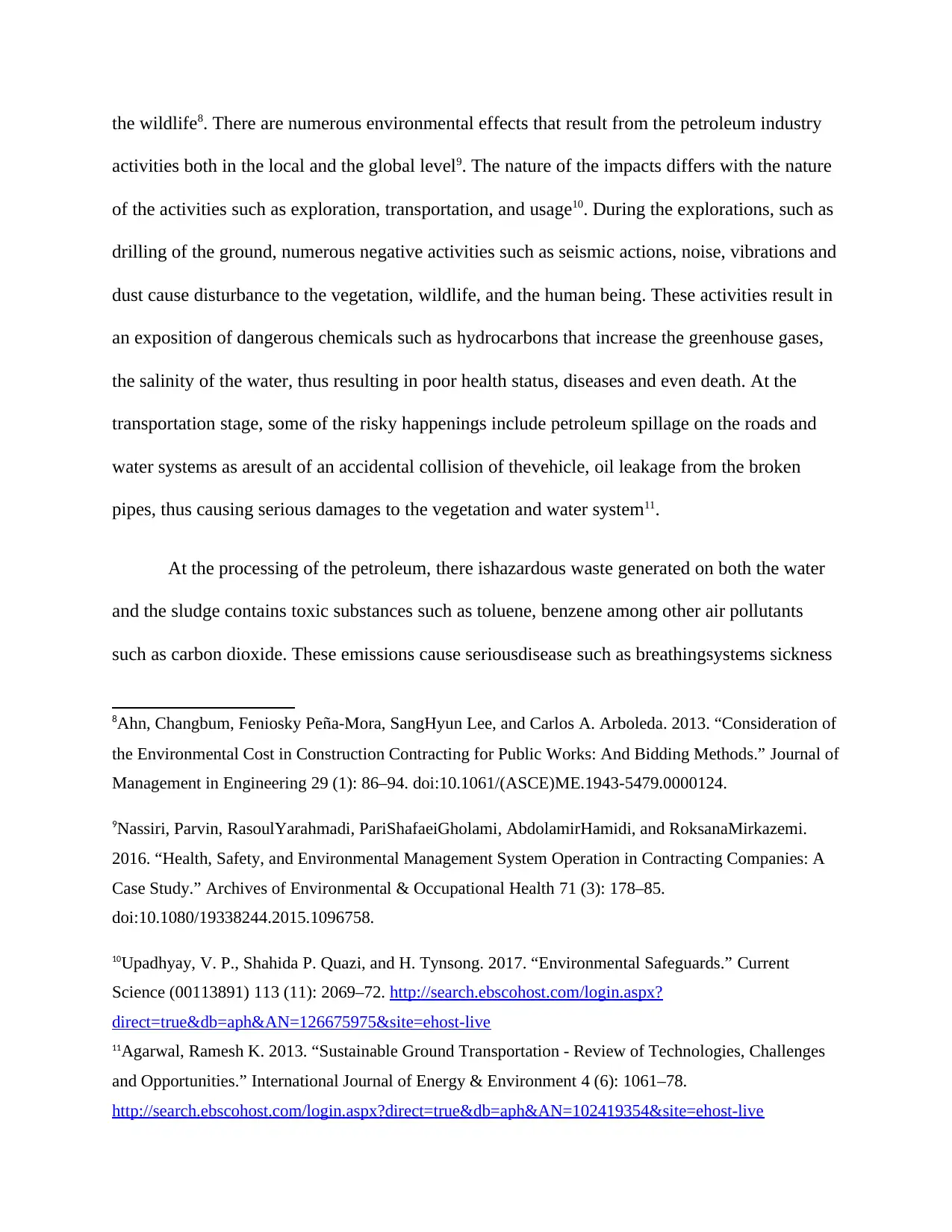
the wildlife8. There are numerous environmental effects that result from the petroleum industry
activities both in the local and the global level9. The nature of the impacts differs with the nature
of the activities such as exploration, transportation, and usage10. During the explorations, such as
drilling of the ground, numerous negative activities such as seismic actions, noise, vibrations and
dust cause disturbance to the vegetation, wildlife, and the human being. These activities result in
an exposition of dangerous chemicals such as hydrocarbons that increase the greenhouse gases,
the salinity of the water, thus resulting in poor health status, diseases and even death. At the
transportation stage, some of the risky happenings include petroleum spillage on the roads and
water systems as aresult of an accidental collision of thevehicle, oil leakage from the broken
pipes, thus causing serious damages to the vegetation and water system11.
At the processing of the petroleum, there ishazardous waste generated on both the water
and the sludge contains toxic substances such as toluene, benzene among other air pollutants
such as carbon dioxide. These emissions cause seriousdisease such as breathingsystems sickness
8Ahn, Changbum, Feniosky Peña-Mora, SangHyun Lee, and Carlos A. Arboleda. 2013. “Consideration of
the Environmental Cost in Construction Contracting for Public Works: And Bidding Methods.” Journal of
Management in Engineering 29 (1): 86–94. doi:10.1061/(ASCE)ME.1943-5479.0000124.
9Nassiri, Parvin, RasoulYarahmadi, PariShafaeiGholami, AbdolamirHamidi, and RoksanaMirkazemi.
2016. “Health, Safety, and Environmental Management System Operation in Contracting Companies: A
Case Study.” Archives of Environmental & Occupational Health 71 (3): 178–85.
doi:10.1080/19338244.2015.1096758.
10Upadhyay, V. P., Shahida P. Quazi, and H. Tynsong. 2017. “Environmental Safeguards.” Current
Science (00113891) 113 (11): 2069–72. http://search.ebscohost.com/login.aspx?
direct=true&db=aph&AN=126675975&site=ehost-live
11Agarwal, Ramesh K. 2013. “Sustainable Ground Transportation - Review of Technologies, Challenges
and Opportunities.” International Journal of Energy & Environment 4 (6): 1061–78.
http://search.ebscohost.com/login.aspx?direct=true&db=aph&AN=102419354&site=ehost-live
activities both in the local and the global level9. The nature of the impacts differs with the nature
of the activities such as exploration, transportation, and usage10. During the explorations, such as
drilling of the ground, numerous negative activities such as seismic actions, noise, vibrations and
dust cause disturbance to the vegetation, wildlife, and the human being. These activities result in
an exposition of dangerous chemicals such as hydrocarbons that increase the greenhouse gases,
the salinity of the water, thus resulting in poor health status, diseases and even death. At the
transportation stage, some of the risky happenings include petroleum spillage on the roads and
water systems as aresult of an accidental collision of thevehicle, oil leakage from the broken
pipes, thus causing serious damages to the vegetation and water system11.
At the processing of the petroleum, there ishazardous waste generated on both the water
and the sludge contains toxic substances such as toluene, benzene among other air pollutants
such as carbon dioxide. These emissions cause seriousdisease such as breathingsystems sickness
8Ahn, Changbum, Feniosky Peña-Mora, SangHyun Lee, and Carlos A. Arboleda. 2013. “Consideration of
the Environmental Cost in Construction Contracting for Public Works: And Bidding Methods.” Journal of
Management in Engineering 29 (1): 86–94. doi:10.1061/(ASCE)ME.1943-5479.0000124.
9Nassiri, Parvin, RasoulYarahmadi, PariShafaeiGholami, AbdolamirHamidi, and RoksanaMirkazemi.
2016. “Health, Safety, and Environmental Management System Operation in Contracting Companies: A
Case Study.” Archives of Environmental & Occupational Health 71 (3): 178–85.
doi:10.1080/19338244.2015.1096758.
10Upadhyay, V. P., Shahida P. Quazi, and H. Tynsong. 2017. “Environmental Safeguards.” Current
Science (00113891) 113 (11): 2069–72. http://search.ebscohost.com/login.aspx?
direct=true&db=aph&AN=126675975&site=ehost-live
11Agarwal, Ramesh K. 2013. “Sustainable Ground Transportation - Review of Technologies, Challenges
and Opportunities.” International Journal of Energy & Environment 4 (6): 1061–78.
http://search.ebscohost.com/login.aspx?direct=true&db=aph&AN=102419354&site=ehost-live
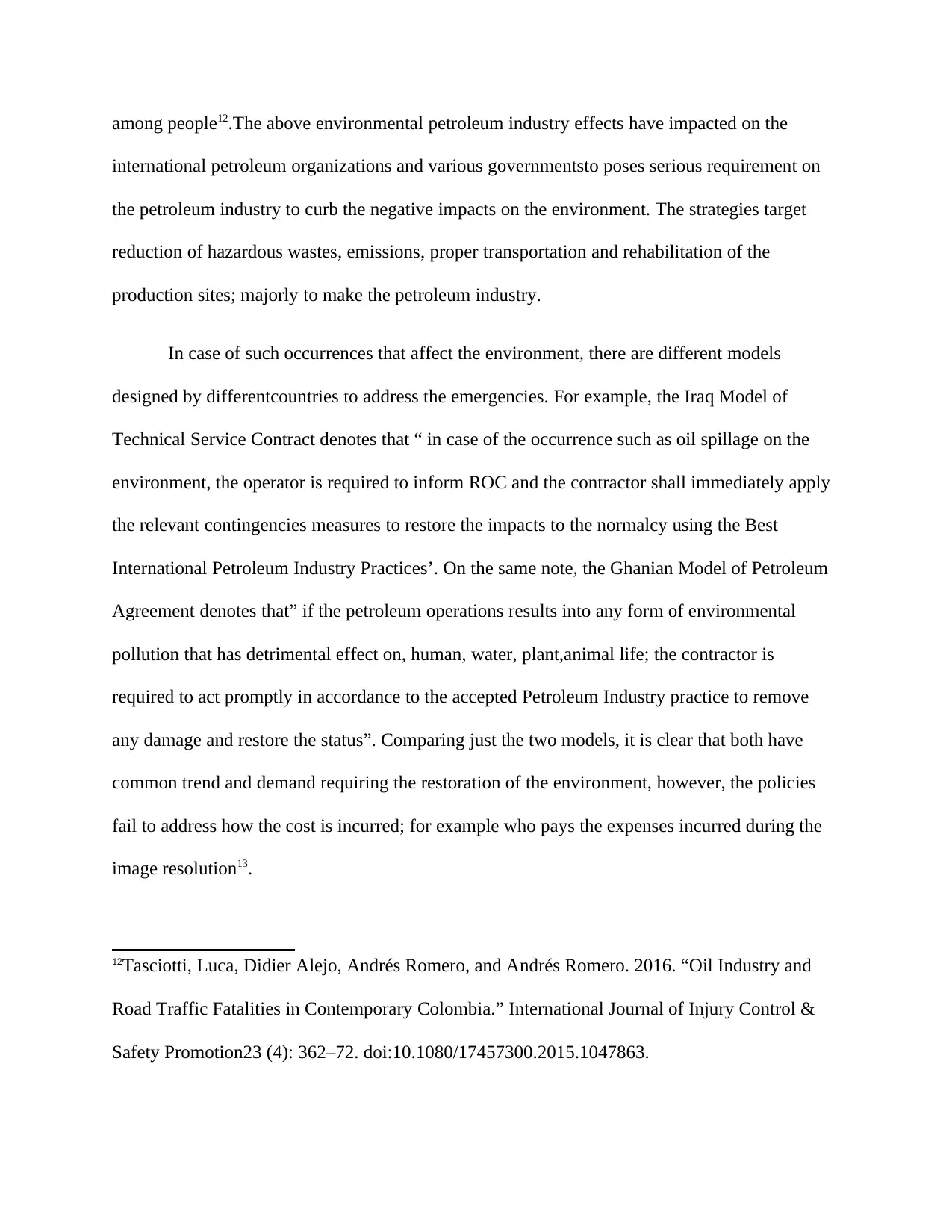
among people12.The above environmental petroleum industry effects have impacted on the
international petroleum organizations and various governmentsto poses serious requirement on
the petroleum industry to curb the negative impacts on the environment. The strategies target
reduction of hazardous wastes, emissions, proper transportation and rehabilitation of the
production sites; majorly to make the petroleum industry.
In case of such occurrences that affect the environment, there are different models
designed by differentcountries to address the emergencies. For example, the Iraq Model of
Technical Service Contract denotes that “ in case of the occurrence such as oil spillage on the
environment, the operator is required to inform ROC and the contractor shall immediately apply
the relevant contingencies measures to restore the impacts to the normalcy using the Best
International Petroleum Industry Practices’. On the same note, the Ghanian Model of Petroleum
Agreement denotes that” if the petroleum operations results into any form of environmental
pollution that has detrimental effect on, human, water, plant,animal life; the contractor is
required to act promptly in accordance to the accepted Petroleum Industry practice to remove
any damage and restore the status”. Comparing just the two models, it is clear that both have
common trend and demand requiring the restoration of the environment, however, the policies
fail to address how the cost is incurred; for example who pays the expenses incurred during the
image resolution13.
12Tasciotti, Luca, Didier Alejo, Andrés Romero, and Andrés Romero. 2016. “Oil Industry and
Road Traffic Fatalities in Contemporary Colombia.” International Journal of Injury Control &
Safety Promotion23 (4): 362–72. doi:10.1080/17457300.2015.1047863.
international petroleum organizations and various governmentsto poses serious requirement on
the petroleum industry to curb the negative impacts on the environment. The strategies target
reduction of hazardous wastes, emissions, proper transportation and rehabilitation of the
production sites; majorly to make the petroleum industry.
In case of such occurrences that affect the environment, there are different models
designed by differentcountries to address the emergencies. For example, the Iraq Model of
Technical Service Contract denotes that “ in case of the occurrence such as oil spillage on the
environment, the operator is required to inform ROC and the contractor shall immediately apply
the relevant contingencies measures to restore the impacts to the normalcy using the Best
International Petroleum Industry Practices’. On the same note, the Ghanian Model of Petroleum
Agreement denotes that” if the petroleum operations results into any form of environmental
pollution that has detrimental effect on, human, water, plant,animal life; the contractor is
required to act promptly in accordance to the accepted Petroleum Industry practice to remove
any damage and restore the status”. Comparing just the two models, it is clear that both have
common trend and demand requiring the restoration of the environment, however, the policies
fail to address how the cost is incurred; for example who pays the expenses incurred during the
image resolution13.
12Tasciotti, Luca, Didier Alejo, Andrés Romero, and Andrés Romero. 2016. “Oil Industry and
Road Traffic Fatalities in Contemporary Colombia.” International Journal of Injury Control &
Safety Promotion23 (4): 362–72. doi:10.1080/17457300.2015.1047863.
⊘ This is a preview!⊘
Do you want full access?
Subscribe today to unlock all pages.

Trusted by 1+ million students worldwide
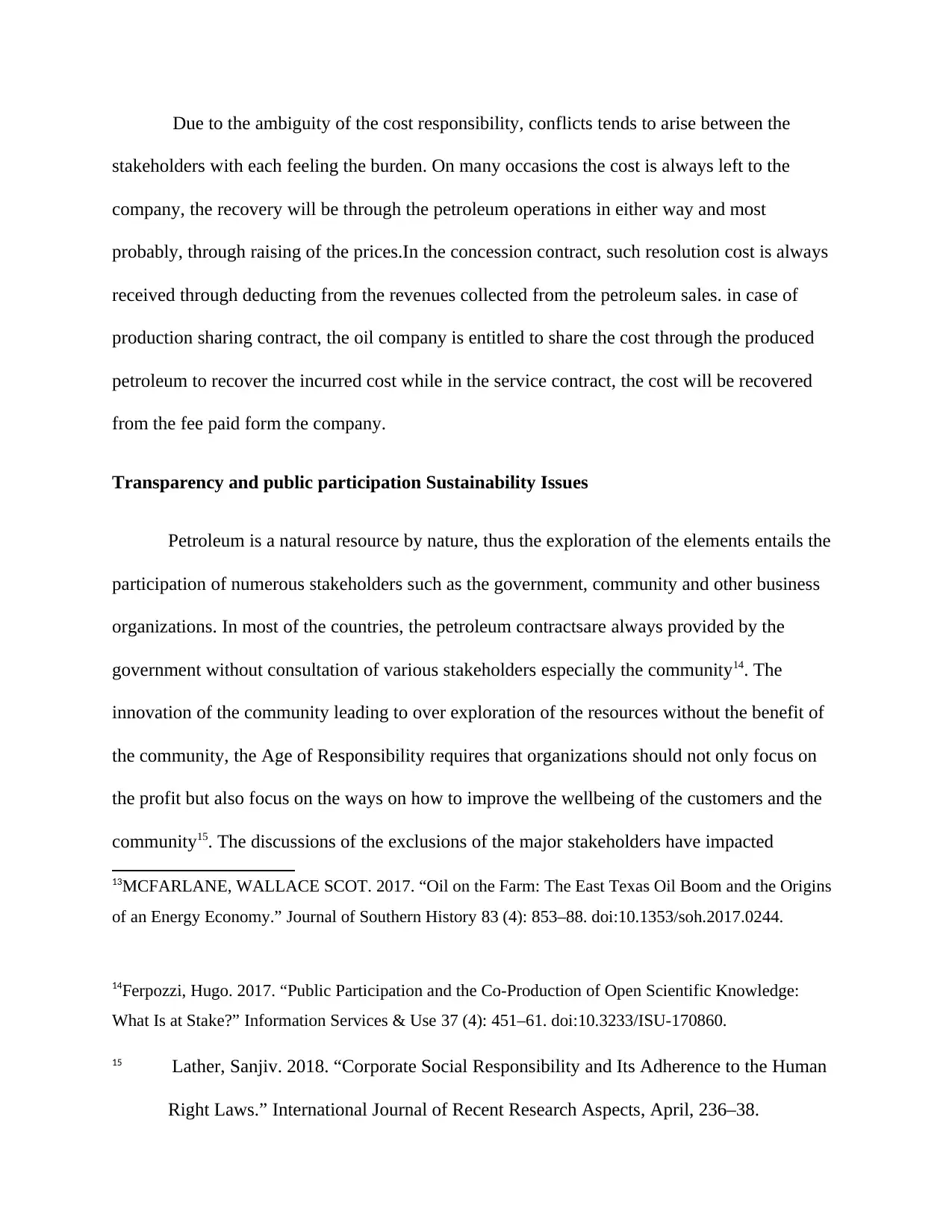
Due to the ambiguity of the cost responsibility, conflicts tends to arise between the
stakeholders with each feeling the burden. On many occasions the cost is always left to the
company, the recovery will be through the petroleum operations in either way and most
probably, through raising of the prices.In the concession contract, such resolution cost is always
received through deducting from the revenues collected from the petroleum sales. in case of
production sharing contract, the oil company is entitled to share the cost through the produced
petroleum to recover the incurred cost while in the service contract, the cost will be recovered
from the fee paid form the company.
Transparency and public participation Sustainability Issues
Petroleum is a natural resource by nature, thus the exploration of the elements entails the
participation of numerous stakeholders such as the government, community and other business
organizations. In most of the countries, the petroleum contractsare always provided by the
government without consultation of various stakeholders especially the community14. The
innovation of the community leading to over exploration of the resources without the benefit of
the community, the Age of Responsibility requires that organizations should not only focus on
the profit but also focus on the ways on how to improve the wellbeing of the customers and the
community15. The discussions of the exclusions of the major stakeholders have impacted
13MCFARLANE, WALLACE SCOT. 2017. “Oil on the Farm: The East Texas Oil Boom and the Origins
of an Energy Economy.” Journal of Southern History 83 (4): 853–88. doi:10.1353/soh.2017.0244.
14Ferpozzi, Hugo. 2017. “Public Participation and the Co-Production of Open Scientific Knowledge:
What Is at Stake?” Information Services & Use 37 (4): 451–61. doi:10.3233/ISU-170860.
15 Lather, Sanjiv. 2018. “Corporate Social Responsibility and Its Adherence to the Human
Right Laws.” International Journal of Recent Research Aspects, April, 236–38.
stakeholders with each feeling the burden. On many occasions the cost is always left to the
company, the recovery will be through the petroleum operations in either way and most
probably, through raising of the prices.In the concession contract, such resolution cost is always
received through deducting from the revenues collected from the petroleum sales. in case of
production sharing contract, the oil company is entitled to share the cost through the produced
petroleum to recover the incurred cost while in the service contract, the cost will be recovered
from the fee paid form the company.
Transparency and public participation Sustainability Issues
Petroleum is a natural resource by nature, thus the exploration of the elements entails the
participation of numerous stakeholders such as the government, community and other business
organizations. In most of the countries, the petroleum contractsare always provided by the
government without consultation of various stakeholders especially the community14. The
innovation of the community leading to over exploration of the resources without the benefit of
the community, the Age of Responsibility requires that organizations should not only focus on
the profit but also focus on the ways on how to improve the wellbeing of the customers and the
community15. The discussions of the exclusions of the major stakeholders have impacted
13MCFARLANE, WALLACE SCOT. 2017. “Oil on the Farm: The East Texas Oil Boom and the Origins
of an Energy Economy.” Journal of Southern History 83 (4): 853–88. doi:10.1353/soh.2017.0244.
14Ferpozzi, Hugo. 2017. “Public Participation and the Co-Production of Open Scientific Knowledge:
What Is at Stake?” Information Services & Use 37 (4): 451–61. doi:10.3233/ISU-170860.
15 Lather, Sanjiv. 2018. “Corporate Social Responsibility and Its Adherence to the Human
Right Laws.” International Journal of Recent Research Aspects, April, 236–38.
Paraphrase This Document
Need a fresh take? Get an instant paraphrase of this document with our AI Paraphraser
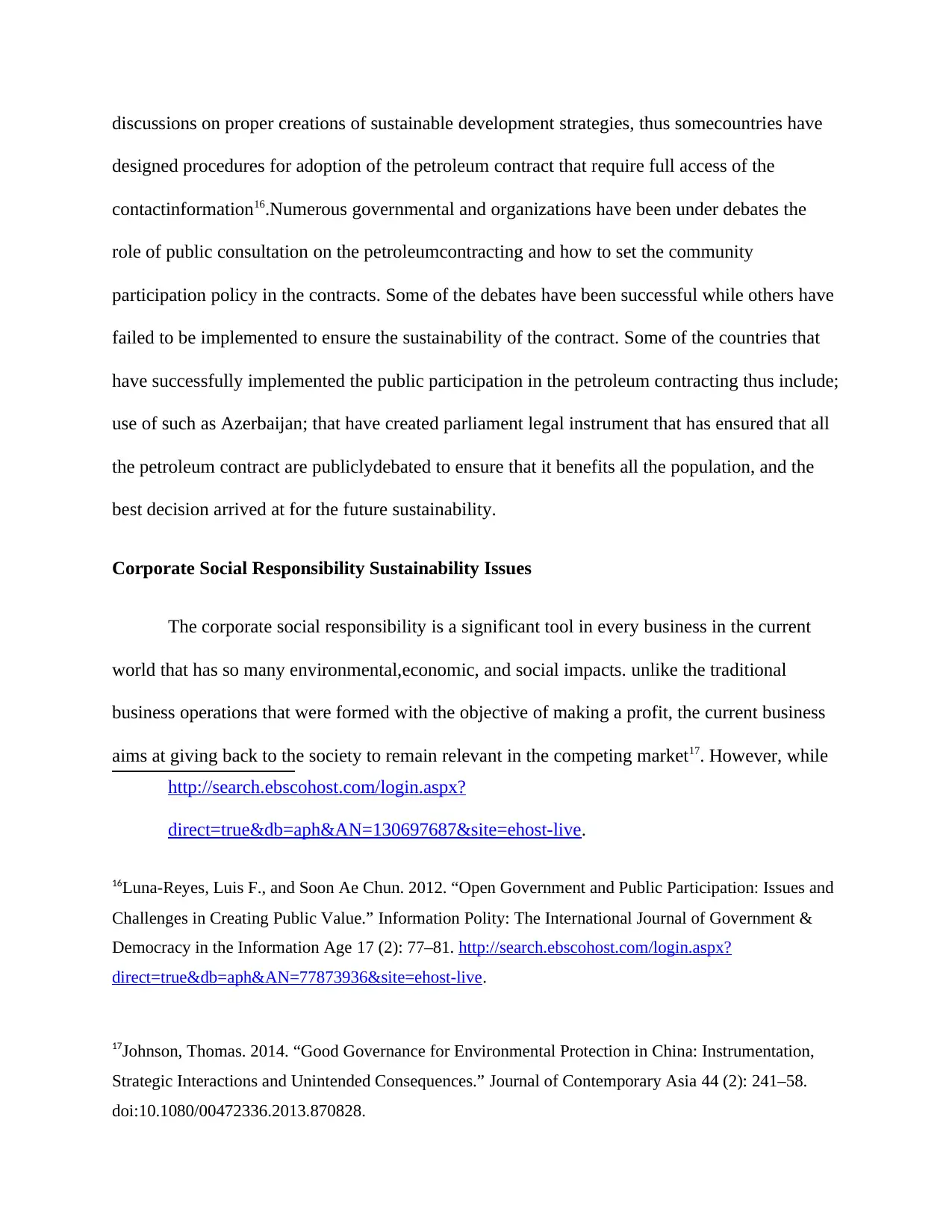
discussions on proper creations of sustainable development strategies, thus somecountries have
designed procedures for adoption of the petroleum contract that require full access of the
contactinformation16.Numerous governmental and organizations have been under debates the
role of public consultation on the petroleumcontracting and how to set the community
participation policy in the contracts. Some of the debates have been successful while others have
failed to be implemented to ensure the sustainability of the contract. Some of the countries that
have successfully implemented the public participation in the petroleum contracting thus include;
use of such as Azerbaijan; that have created parliament legal instrument that has ensured that all
the petroleum contract are publiclydebated to ensure that it benefits all the population, and the
best decision arrived at for the future sustainability.
Corporate Social Responsibility Sustainability Issues
The corporate social responsibility is a significant tool in every business in the current
world that has so many environmental,economic, and social impacts. unlike the traditional
business operations that were formed with the objective of making a profit, the current business
aims at giving back to the society to remain relevant in the competing market17. However, while
http://search.ebscohost.com/login.aspx?
direct=true&db=aph&AN=130697687&site=ehost-live.
16Luna-Reyes, Luis F., and Soon Ae Chun. 2012. “Open Government and Public Participation: Issues and
Challenges in Creating Public Value.” Information Polity: The International Journal of Government &
Democracy in the Information Age 17 (2): 77–81. http://search.ebscohost.com/login.aspx?
direct=true&db=aph&AN=77873936&site=ehost-live.
17Johnson, Thomas. 2014. “Good Governance for Environmental Protection in China: Instrumentation,
Strategic Interactions and Unintended Consequences.” Journal of Contemporary Asia 44 (2): 241–58.
doi:10.1080/00472336.2013.870828.
designed procedures for adoption of the petroleum contract that require full access of the
contactinformation16.Numerous governmental and organizations have been under debates the
role of public consultation on the petroleumcontracting and how to set the community
participation policy in the contracts. Some of the debates have been successful while others have
failed to be implemented to ensure the sustainability of the contract. Some of the countries that
have successfully implemented the public participation in the petroleum contracting thus include;
use of such as Azerbaijan; that have created parliament legal instrument that has ensured that all
the petroleum contract are publiclydebated to ensure that it benefits all the population, and the
best decision arrived at for the future sustainability.
Corporate Social Responsibility Sustainability Issues
The corporate social responsibility is a significant tool in every business in the current
world that has so many environmental,economic, and social impacts. unlike the traditional
business operations that were formed with the objective of making a profit, the current business
aims at giving back to the society to remain relevant in the competing market17. However, while
http://search.ebscohost.com/login.aspx?
direct=true&db=aph&AN=130697687&site=ehost-live.
16Luna-Reyes, Luis F., and Soon Ae Chun. 2012. “Open Government and Public Participation: Issues and
Challenges in Creating Public Value.” Information Polity: The International Journal of Government &
Democracy in the Information Age 17 (2): 77–81. http://search.ebscohost.com/login.aspx?
direct=true&db=aph&AN=77873936&site=ehost-live.
17Johnson, Thomas. 2014. “Good Governance for Environmental Protection in China: Instrumentation,
Strategic Interactions and Unintended Consequences.” Journal of Contemporary Asia 44 (2): 241–58.
doi:10.1080/00472336.2013.870828.
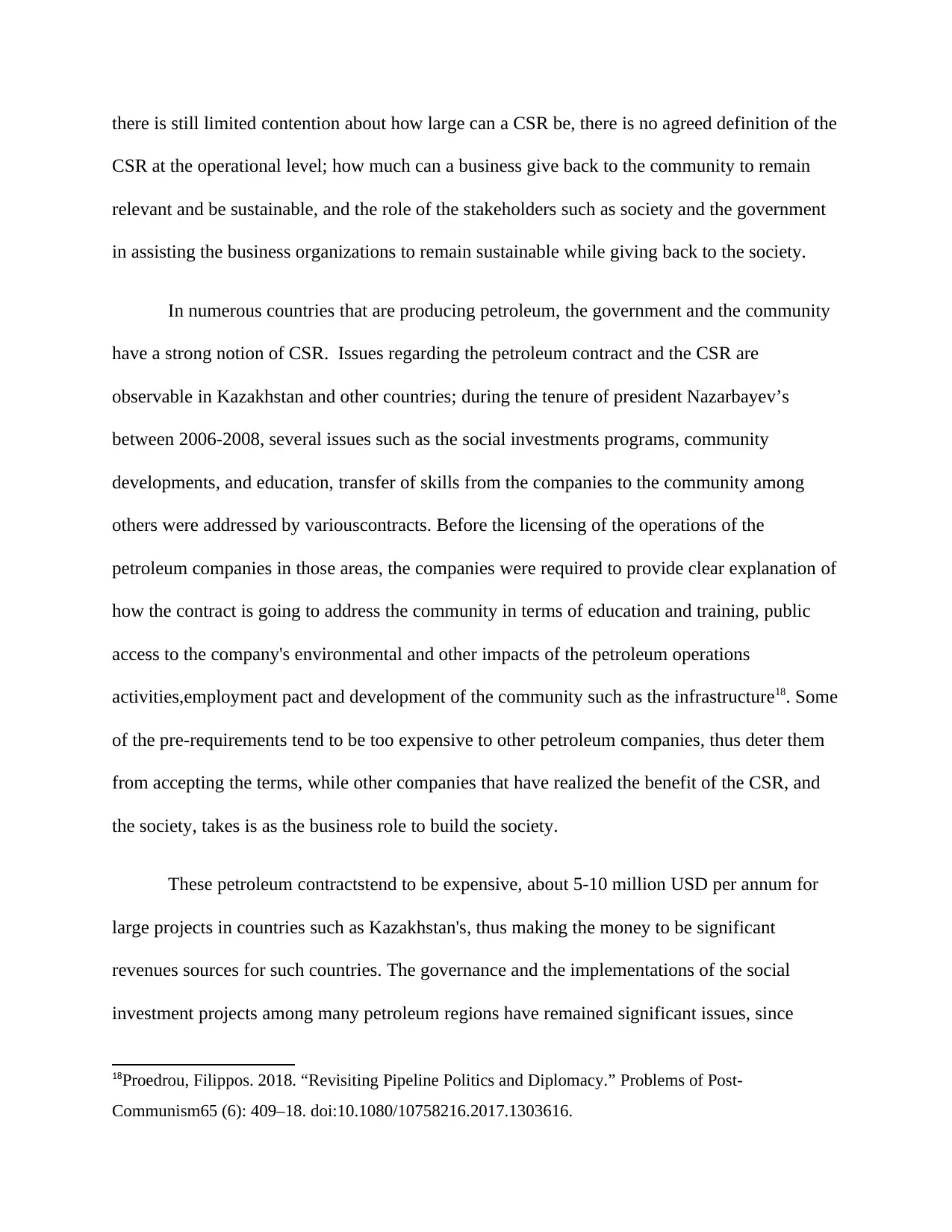
there is still limited contention about how large can a CSR be, there is no agreed definition of the
CSR at the operational level; how much can a business give back to the community to remain
relevant and be sustainable, and the role of the stakeholders such as society and the government
in assisting the business organizations to remain sustainable while giving back to the society.
In numerous countries that are producing petroleum, the government and the community
have a strong notion of CSR. Issues regarding the petroleum contract and the CSR are
observable in Kazakhstan and other countries; during the tenure of president Nazarbayev’s
between 2006-2008, several issues such as the social investments programs, community
developments, and education, transfer of skills from the companies to the community among
others were addressed by variouscontracts. Before the licensing of the operations of the
petroleum companies in those areas, the companies were required to provide clear explanation of
how the contract is going to address the community in terms of education and training, public
access to the company's environmental and other impacts of the petroleum operations
activities,employment pact and development of the community such as the infrastructure18. Some
of the pre-requirements tend to be too expensive to other petroleum companies, thus deter them
from accepting the terms, while other companies that have realized the benefit of the CSR, and
the society, takes is as the business role to build the society.
These petroleum contractstend to be expensive, about 5-10 million USD per annum for
large projects in countries such as Kazakhstan's, thus making the money to be significant
revenues sources for such countries. The governance and the implementations of the social
investment projects among many petroleum regions have remained significant issues, since
18Proedrou, Filippos. 2018. “Revisiting Pipeline Politics and Diplomacy.” Problems of Post-
Communism65 (6): 409–18. doi:10.1080/10758216.2017.1303616.
CSR at the operational level; how much can a business give back to the community to remain
relevant and be sustainable, and the role of the stakeholders such as society and the government
in assisting the business organizations to remain sustainable while giving back to the society.
In numerous countries that are producing petroleum, the government and the community
have a strong notion of CSR. Issues regarding the petroleum contract and the CSR are
observable in Kazakhstan and other countries; during the tenure of president Nazarbayev’s
between 2006-2008, several issues such as the social investments programs, community
developments, and education, transfer of skills from the companies to the community among
others were addressed by variouscontracts. Before the licensing of the operations of the
petroleum companies in those areas, the companies were required to provide clear explanation of
how the contract is going to address the community in terms of education and training, public
access to the company's environmental and other impacts of the petroleum operations
activities,employment pact and development of the community such as the infrastructure18. Some
of the pre-requirements tend to be too expensive to other petroleum companies, thus deter them
from accepting the terms, while other companies that have realized the benefit of the CSR, and
the society, takes is as the business role to build the society.
These petroleum contractstend to be expensive, about 5-10 million USD per annum for
large projects in countries such as Kazakhstan's, thus making the money to be significant
revenues sources for such countries. The governance and the implementations of the social
investment projects among many petroleum regions have remained significant issues, since
18Proedrou, Filippos. 2018. “Revisiting Pipeline Politics and Diplomacy.” Problems of Post-
Communism65 (6): 409–18. doi:10.1080/10758216.2017.1303616.
⊘ This is a preview!⊘
Do you want full access?
Subscribe today to unlock all pages.

Trusted by 1+ million students worldwide
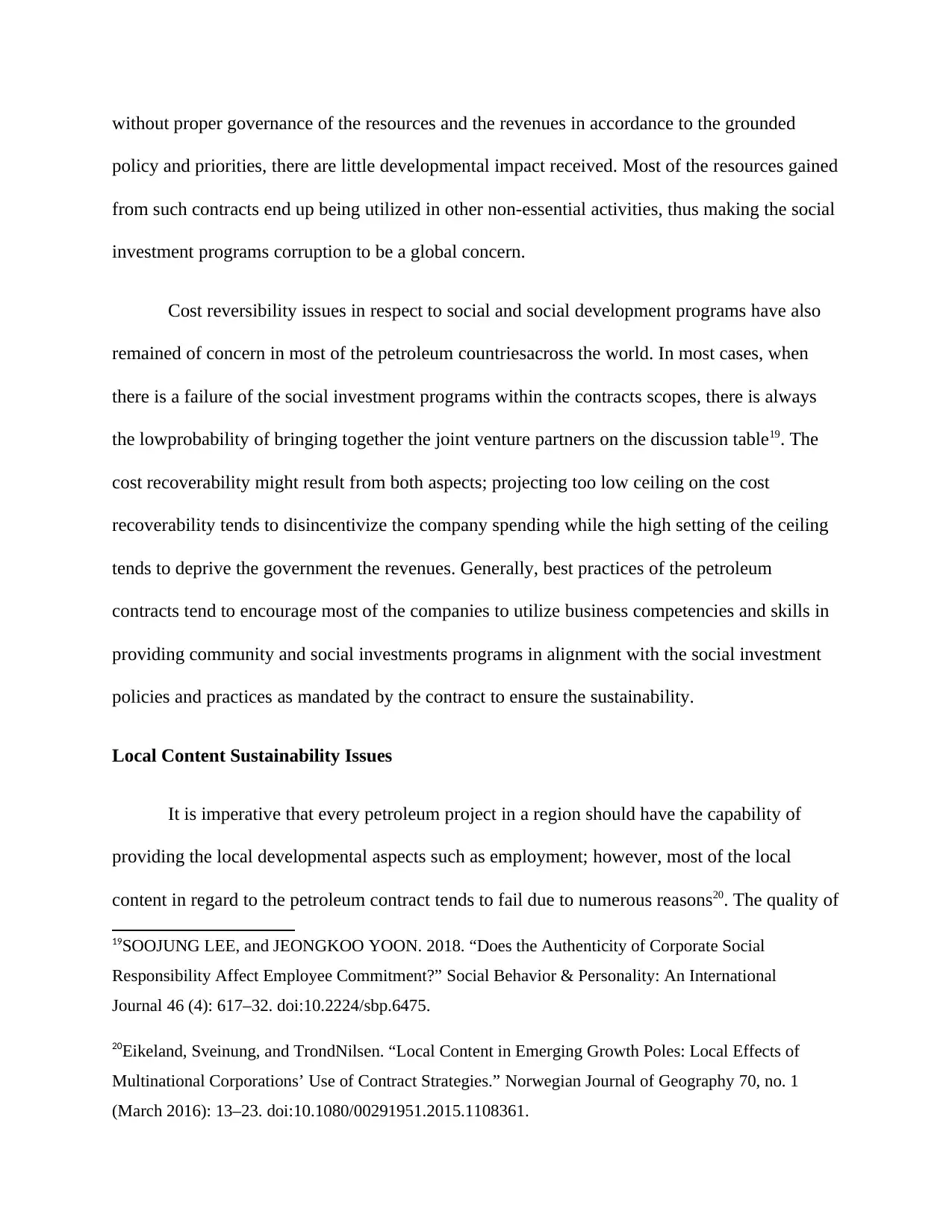
without proper governance of the resources and the revenues in accordance to the grounded
policy and priorities, there are little developmental impact received. Most of the resources gained
from such contracts end up being utilized in other non-essential activities, thus making the social
investment programs corruption to be a global concern.
Cost reversibility issues in respect to social and social development programs have also
remained of concern in most of the petroleum countriesacross the world. In most cases, when
there is a failure of the social investment programs within the contracts scopes, there is always
the lowprobability of bringing together the joint venture partners on the discussion table19. The
cost recoverability might result from both aspects; projecting too low ceiling on the cost
recoverability tends to disincentivize the company spending while the high setting of the ceiling
tends to deprive the government the revenues. Generally, best practices of the petroleum
contracts tend to encourage most of the companies to utilize business competencies and skills in
providing community and social investments programs in alignment with the social investment
policies and practices as mandated by the contract to ensure the sustainability.
Local Content Sustainability Issues
It is imperative that every petroleum project in a region should have the capability of
providing the local developmental aspects such as employment; however, most of the local
content in regard to the petroleum contract tends to fail due to numerous reasons20. The quality of
19SOOJUNG LEE, and JEONGKOO YOON. 2018. “Does the Authenticity of Corporate Social
Responsibility Affect Employee Commitment?” Social Behavior & Personality: An International
Journal 46 (4): 617–32. doi:10.2224/sbp.6475.
20Eikeland, Sveinung, and TrondNilsen. “Local Content in Emerging Growth Poles: Local Effects of
Multinational Corporations’ Use of Contract Strategies.” Norwegian Journal of Geography 70, no. 1
(March 2016): 13–23. doi:10.1080/00291951.2015.1108361.
policy and priorities, there are little developmental impact received. Most of the resources gained
from such contracts end up being utilized in other non-essential activities, thus making the social
investment programs corruption to be a global concern.
Cost reversibility issues in respect to social and social development programs have also
remained of concern in most of the petroleum countriesacross the world. In most cases, when
there is a failure of the social investment programs within the contracts scopes, there is always
the lowprobability of bringing together the joint venture partners on the discussion table19. The
cost recoverability might result from both aspects; projecting too low ceiling on the cost
recoverability tends to disincentivize the company spending while the high setting of the ceiling
tends to deprive the government the revenues. Generally, best practices of the petroleum
contracts tend to encourage most of the companies to utilize business competencies and skills in
providing community and social investments programs in alignment with the social investment
policies and practices as mandated by the contract to ensure the sustainability.
Local Content Sustainability Issues
It is imperative that every petroleum project in a region should have the capability of
providing the local developmental aspects such as employment; however, most of the local
content in regard to the petroleum contract tends to fail due to numerous reasons20. The quality of
19SOOJUNG LEE, and JEONGKOO YOON. 2018. “Does the Authenticity of Corporate Social
Responsibility Affect Employee Commitment?” Social Behavior & Personality: An International
Journal 46 (4): 617–32. doi:10.2224/sbp.6475.
20Eikeland, Sveinung, and TrondNilsen. “Local Content in Emerging Growth Poles: Local Effects of
Multinational Corporations’ Use of Contract Strategies.” Norwegian Journal of Geography 70, no. 1
(March 2016): 13–23. doi:10.1080/00291951.2015.1108361.
Paraphrase This Document
Need a fresh take? Get an instant paraphrase of this document with our AI Paraphraser
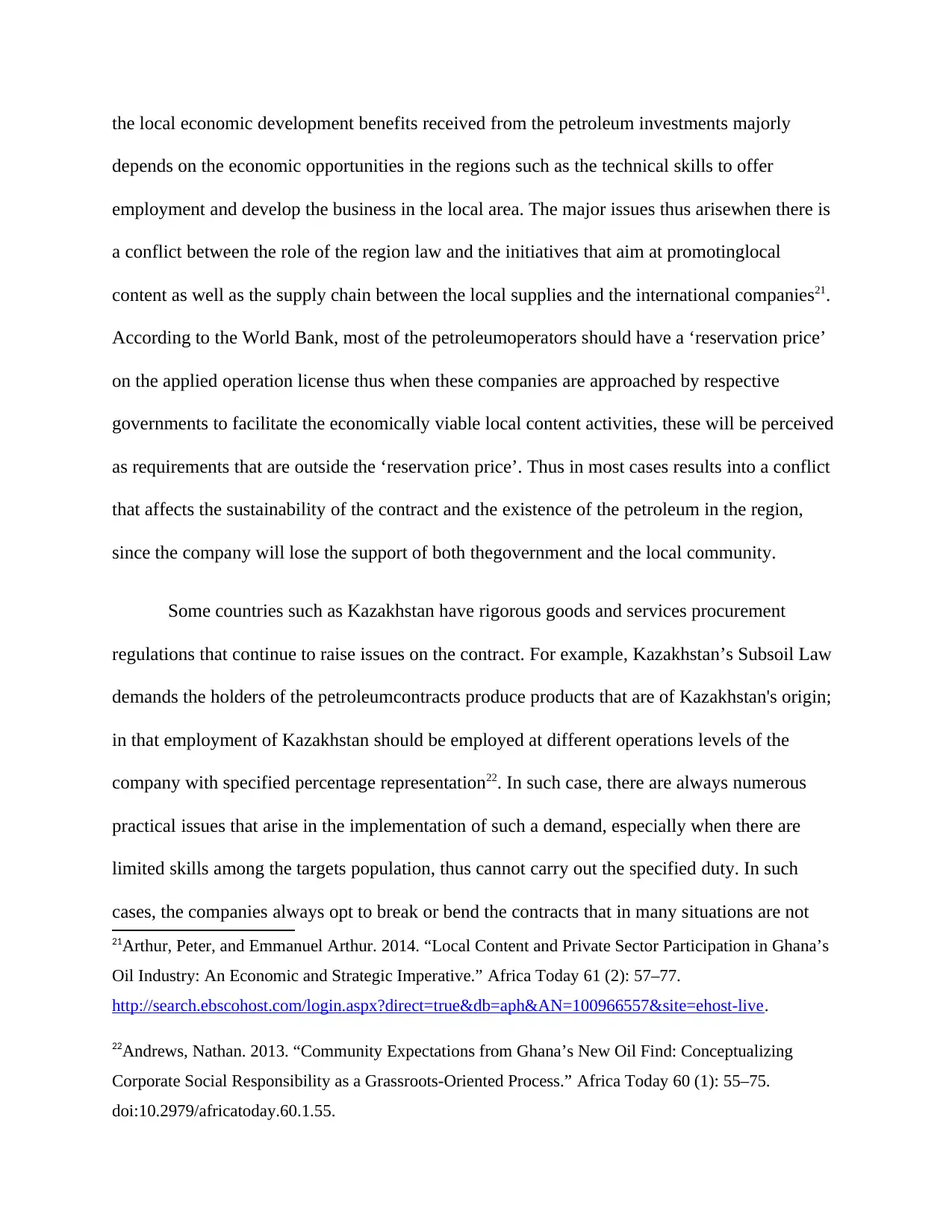
the local economic development benefits received from the petroleum investments majorly
depends on the economic opportunities in the regions such as the technical skills to offer
employment and develop the business in the local area. The major issues thus arisewhen there is
a conflict between the role of the region law and the initiatives that aim at promotinglocal
content as well as the supply chain between the local supplies and the international companies21.
According to the World Bank, most of the petroleumoperators should have a ‘reservation price’
on the applied operation license thus when these companies are approached by respective
governments to facilitate the economically viable local content activities, these will be perceived
as requirements that are outside the ‘reservation price’. Thus in most cases results into a conflict
that affects the sustainability of the contract and the existence of the petroleum in the region,
since the company will lose the support of both thegovernment and the local community.
Some countries such as Kazakhstan have rigorous goods and services procurement
regulations that continue to raise issues on the contract. For example, Kazakhstan’s Subsoil Law
demands the holders of the petroleumcontracts produce products that are of Kazakhstan's origin;
in that employment of Kazakhstan should be employed at different operations levels of the
company with specified percentage representation22. In such case, there are always numerous
practical issues that arise in the implementation of such a demand, especially when there are
limited skills among the targets population, thus cannot carry out the specified duty. In such
cases, the companies always opt to break or bend the contracts that in many situations are not
21Arthur, Peter, and Emmanuel Arthur. 2014. “Local Content and Private Sector Participation in Ghana’s
Oil Industry: An Economic and Strategic Imperative.” Africa Today 61 (2): 57–77.
http://search.ebscohost.com/login.aspx?direct=true&db=aph&AN=100966557&site=ehost-live.
22Andrews, Nathan. 2013. “Community Expectations from Ghana’s New Oil Find: Conceptualizing
Corporate Social Responsibility as a Grassroots-Oriented Process.” Africa Today 60 (1): 55–75.
doi:10.2979/africatoday.60.1.55.
depends on the economic opportunities in the regions such as the technical skills to offer
employment and develop the business in the local area. The major issues thus arisewhen there is
a conflict between the role of the region law and the initiatives that aim at promotinglocal
content as well as the supply chain between the local supplies and the international companies21.
According to the World Bank, most of the petroleumoperators should have a ‘reservation price’
on the applied operation license thus when these companies are approached by respective
governments to facilitate the economically viable local content activities, these will be perceived
as requirements that are outside the ‘reservation price’. Thus in most cases results into a conflict
that affects the sustainability of the contract and the existence of the petroleum in the region,
since the company will lose the support of both thegovernment and the local community.
Some countries such as Kazakhstan have rigorous goods and services procurement
regulations that continue to raise issues on the contract. For example, Kazakhstan’s Subsoil Law
demands the holders of the petroleumcontracts produce products that are of Kazakhstan's origin;
in that employment of Kazakhstan should be employed at different operations levels of the
company with specified percentage representation22. In such case, there are always numerous
practical issues that arise in the implementation of such a demand, especially when there are
limited skills among the targets population, thus cannot carry out the specified duty. In such
cases, the companies always opt to break or bend the contracts that in many situations are not
21Arthur, Peter, and Emmanuel Arthur. 2014. “Local Content and Private Sector Participation in Ghana’s
Oil Industry: An Economic and Strategic Imperative.” Africa Today 61 (2): 57–77.
http://search.ebscohost.com/login.aspx?direct=true&db=aph&AN=100966557&site=ehost-live.
22Andrews, Nathan. 2013. “Community Expectations from Ghana’s New Oil Find: Conceptualizing
Corporate Social Responsibility as a Grassroots-Oriented Process.” Africa Today 60 (1): 55–75.
doi:10.2979/africatoday.60.1.55.
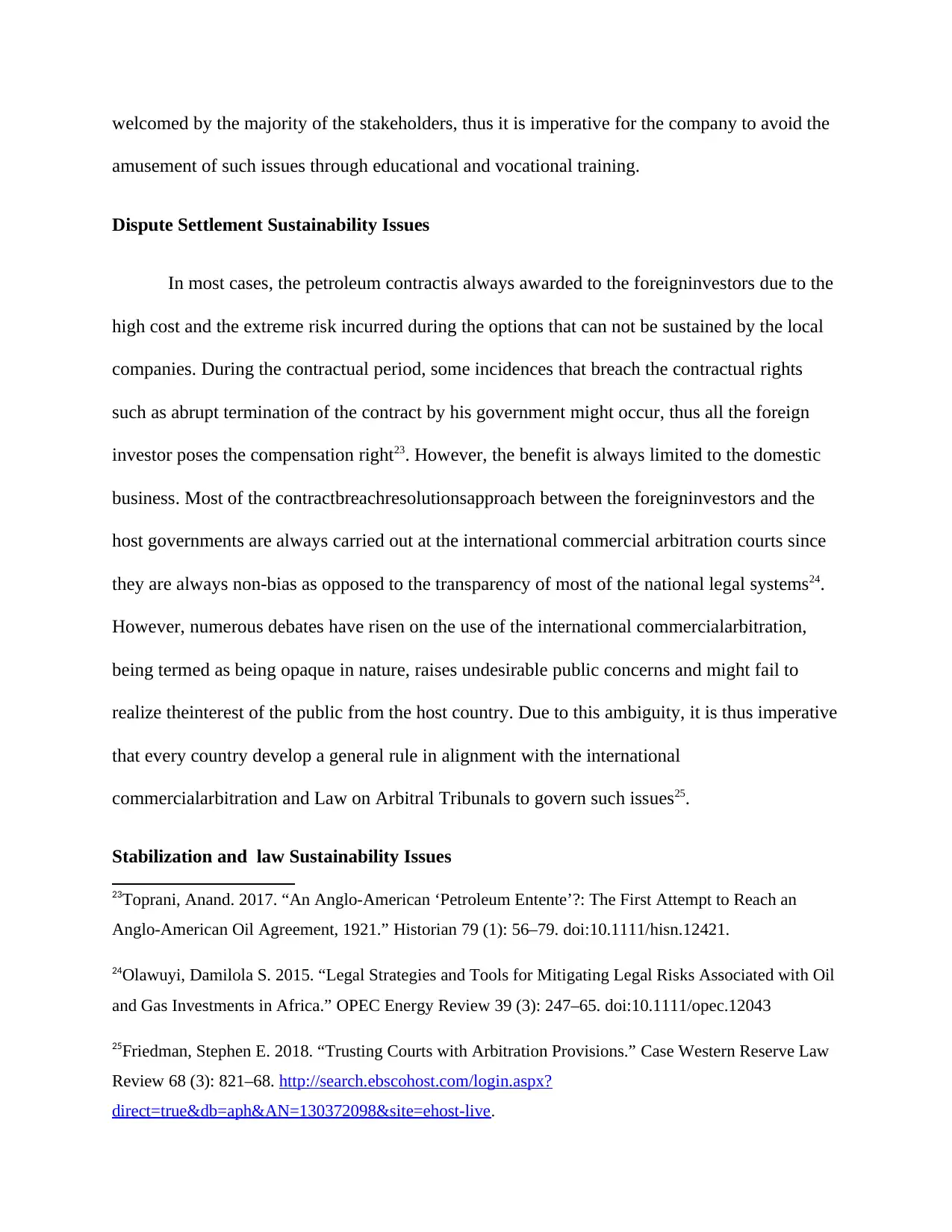
welcomed by the majority of the stakeholders, thus it is imperative for the company to avoid the
amusement of such issues through educational and vocational training.
Dispute Settlement Sustainability Issues
In most cases, the petroleum contractis always awarded to the foreigninvestors due to the
high cost and the extreme risk incurred during the options that can not be sustained by the local
companies. During the contractual period, some incidences that breach the contractual rights
such as abrupt termination of the contract by his government might occur, thus all the foreign
investor poses the compensation right23. However, the benefit is always limited to the domestic
business. Most of the contractbreachresolutionsapproach between the foreigninvestors and the
host governments are always carried out at the international commercial arbitration courts since
they are always non-bias as opposed to the transparency of most of the national legal systems24.
However, numerous debates have risen on the use of the international commercialarbitration,
being termed as being opaque in nature, raises undesirable public concerns and might fail to
realize theinterest of the public from the host country. Due to this ambiguity, it is thus imperative
that every country develop a general rule in alignment with the international
commercialarbitration and Law on Arbitral Tribunals to govern such issues25.
Stabilization and law Sustainability Issues
23Toprani, Anand. 2017. “An Anglo-American ‘Petroleum Entente’?: The First Attempt to Reach an
Anglo-American Oil Agreement, 1921.” Historian 79 (1): 56–79. doi:10.1111/hisn.12421.
24Olawuyi, Damilola S. 2015. “Legal Strategies and Tools for Mitigating Legal Risks Associated with Oil
and Gas Investments in Africa.” OPEC Energy Review 39 (3): 247–65. doi:10.1111/opec.12043
25Friedman, Stephen E. 2018. “Trusting Courts with Arbitration Provisions.” Case Western Reserve Law
Review 68 (3): 821–68. http://search.ebscohost.com/login.aspx?
direct=true&db=aph&AN=130372098&site=ehost-live.
amusement of such issues through educational and vocational training.
Dispute Settlement Sustainability Issues
In most cases, the petroleum contractis always awarded to the foreigninvestors due to the
high cost and the extreme risk incurred during the options that can not be sustained by the local
companies. During the contractual period, some incidences that breach the contractual rights
such as abrupt termination of the contract by his government might occur, thus all the foreign
investor poses the compensation right23. However, the benefit is always limited to the domestic
business. Most of the contractbreachresolutionsapproach between the foreigninvestors and the
host governments are always carried out at the international commercial arbitration courts since
they are always non-bias as opposed to the transparency of most of the national legal systems24.
However, numerous debates have risen on the use of the international commercialarbitration,
being termed as being opaque in nature, raises undesirable public concerns and might fail to
realize theinterest of the public from the host country. Due to this ambiguity, it is thus imperative
that every country develop a general rule in alignment with the international
commercialarbitration and Law on Arbitral Tribunals to govern such issues25.
Stabilization and law Sustainability Issues
23Toprani, Anand. 2017. “An Anglo-American ‘Petroleum Entente’?: The First Attempt to Reach an
Anglo-American Oil Agreement, 1921.” Historian 79 (1): 56–79. doi:10.1111/hisn.12421.
24Olawuyi, Damilola S. 2015. “Legal Strategies and Tools for Mitigating Legal Risks Associated with Oil
and Gas Investments in Africa.” OPEC Energy Review 39 (3): 247–65. doi:10.1111/opec.12043
25Friedman, Stephen E. 2018. “Trusting Courts with Arbitration Provisions.” Case Western Reserve Law
Review 68 (3): 821–68. http://search.ebscohost.com/login.aspx?
direct=true&db=aph&AN=130372098&site=ehost-live.
⊘ This is a preview!⊘
Do you want full access?
Subscribe today to unlock all pages.

Trusted by 1+ million students worldwide
1 out of 23
Related Documents
Your All-in-One AI-Powered Toolkit for Academic Success.
+13062052269
info@desklib.com
Available 24*7 on WhatsApp / Email
![[object Object]](/_next/static/media/star-bottom.7253800d.svg)
Unlock your academic potential
Copyright © 2020–2026 A2Z Services. All Rights Reserved. Developed and managed by ZUCOL.





